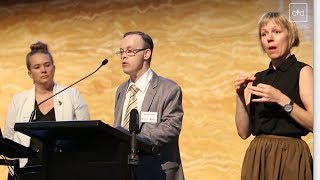Wednesday, 07 January, 2026г.
















Где искать: по сайтам Запорожской области, статьи, видео ролики
пример: покупка автомобиля в Запорожье
Mental Health of People with Intellectual Disability - National Roundtable 2018 key speeches
How do we make sure the NDIS will work for people with intellectual disability and complex behaviour support needs?
Watch extracts of key speeches at the 2018 National Roundtable on the Mental Health of People with Intellectual Disability. A transcript is below.
Speakers are:
- Michael Sullivan, CID Vice Chairperson
- The Hon. Brad Hazzard MP
- Professor Julian Trollor, Chair of Intellectual Disability Mental Health at UNSW
- Jim Simpson, CID Senior Advocate
The event was led by Professor Julian Trollor and 3DN UNSW, with 155 leaders in health and disability from attending.
Read a report from the Roundtable at http://www.nswcid.org.au/blog/a-pathway-through-complexity.html
TRANSCRIPT
Michael Sullivan, Vice-chair, Council for Intellectual Disability
Every person with an intellectual disability is an individual with a name and a life. We are not just a collection of behaviours or a syndrome, but people with intellectual disabilities are very often treated as if we are nobodies, as if we are invisible.
The standard of mental healthcare for most people with intellectual disability at the moment borders on neglect.
When the draft national mental health plan came out in 2016 it did not even mention people with intellectual disability.
Even when we do get to see the doctor, it can be really hard with people with intellectual disability to explain to a doctor what's going on if they are mentally unwell.
We need a doctor to take lots of time to listen properly to get to know us and not just to write us off as too difficult.
A lot of people with intellectual disability can't talk, or explain in words how they feel.
They communicate how they feel by their behaviour.
There are not nearly enough doctors and nurses who understand how to work out mental health problems for a person with an intellectual disability.
The Hon. Brad Hazzard, Minister for Health
In the various portfolios that I've had both in opposition and in government, I have seen the challenges of people with intellectual disabilities, disabilities more broadly, mental health intersecting with disability.
It becomes just one more giant step that you have to cope with.
The system itself - health - from my experience, people do want to do the right thing. But quite often the doctors, the nurses, the allied health staff, don't really know how to work with people with a disability.
And of course the person with the disability: listen to the person with the disability.
Professor Julian Trollor, UNSW Medicine 3DN
One statistic that stands out is the tenfold higher rates of recommendations for antipsychotic treatment for this group, which doesn't really match the known increasing prevalence of mental disorders.
But we saw that people with intellectual disability experienced much longer in-patient mental health stays, and this is what determines the higher overall costs.
Jim Simpson, Senior Advocate, Council for Intellectual Disability
Overall, what we still haven't achieved around Australia is getting the mental health needs of people with intellectual disability into the fabric of mainstream mental health thinking.
All too often we see valuable initiatives that just don't seem to have thought about people with intellectual disability.
On the positive side right now, and this we're hoping is a really important positive side, the final version of the fifth national mental health plan squarely spells out those mental health disparities experienced by people with intellectual disability.
And that to us is probably the core of what we are here about today: getting right into the fabric of metal health thinking.
Теги:
Mental Health Intellectual Disability Disability NDIS National Disability Insurance Scheme UNSW yt:cc=on
Похожие видео
Мой аккаунт


 У вашего броузера проблема в совместимости с HTML5
У вашего броузера проблема в совместимости с HTML5


